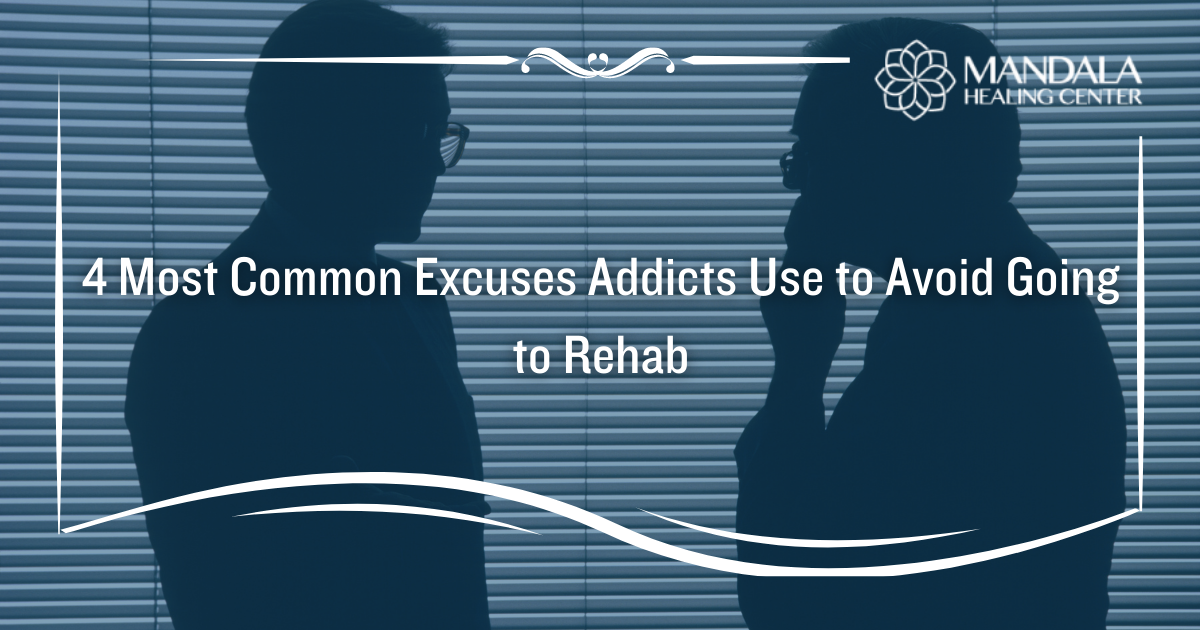Addiction affects millions and prevents them from living healthy, fulfilling lifestyles. Substance abuse and addiction can lead to severe, life-altering consequences for a person’s mental and physical health. It can break down relationships, lead to job losses and financial problems, or result in legal issues that haunt people for years.
For all the damage substance abuse can do to a person’s life and community, it might seem like people would happily seek addiction treatment when needed. However, many barriers prevent people from seeking the treatment necessary to regain control of their lives. Concerns about the stigma surrounding addiction or taking time away from family members can be real, serious issues for people who need addiction treatment.
But people with addiction may also have other excuses for not seeking the treatment they need. Knowing the most common excuses addicts use to avoid going to rehab might help you to convince a loved one to get the treatment they need.
If you or someone you care about needs substance abuse treatment, contact the caring Mandala Healing Center specialists today to learn about starting one of our programs.
1. “I’m Not as Bad as Other People”
One of the most common excuses addicts use to avoid rehab is comparing themselves to others. They may point out others who use or drink more than they do or who have faced more serious problems related to their substance abuse.
Some people living with addiction are in denial about their substance abuse. They may believe that they do not have a problem because they have not hit rock bottom. But addiction usually gets worse the longer it goes untreated. While your loved one may not have experienced physical or mental health trouble, lost jobs, or lost relationships because of their substance abuse, they may experience these in the future without getting treatment.
Some people live in such deep denial that it can take a severe event–an injury or medical event, facing legal trouble, the loss of a relationship–to break through it. However, friends and family may be able to help an addict in denial by planning an intervention.
2. “Rehab Doesn’t Work”
Another common excuse addicts use to avoid going to treatment is that rehab doesn’t work. They may point to friends or family members who have tried rehab but still abuse drugs or alcohol, or they may have their own history or attempts at getting sober.
Addiction is never truly cured. Instead, people must find ways to prevent relapse after detox and stay committed to sobriety for life. This can take significant time and energy, but it is essential for long-lasting recovery.
A relapse–using drugs after a period of sobriety– can happen at any point in recovery. It can happen for various reasons: experiencing challenging emotions, not having enough time in rehab, a lack of support in the community, or boredom.
Understanding that relapse is often a normal part of the recovery process–and not a failure–may help people with addiction be open to attempting rehab, even after an unsuccessful attempt at sobriety in the past.
3. “I Need it to Sleep/Relax/Cope”
Addiction is not simply a physical condition. Emotional or behavioral dependence can play a role in substance abuse and addiction. When stress levels overwhelm people’s ability to cope, they may turn to any means necessary to escape. People may use substances to manage symptoms of a mental illness, physical pain, or emotional discomfort. This is called self-medicating.
People often self-medicate because many substances cause effects that can temporarily numb physical or emotional pain. The condition is likely to worsen without addressing and treating the symptoms of a mental illness. People with both an addiction and depression may get caught in a cycle–their mental illness prevents them from seeking addiction treatment, and their addiction worsens the symptoms of their depression.
Knowing that treatment can give people healthy ways to cope with emotional and physical pain may help your loved one choose to seek treatment.
4. “I Can’t Afford Rehab”
Many people feel anxious about paying for rehab, so they use this as one of their many excuses to avoid rehab. Many high-quality treatment programs are expensive, and finding the money to cover the cost of rehab can feel overwhelming. However, addiction is costly. In addition to the cost of drugs or alcohol, the actual price of addiction includes severe harm to a person’s mental and physical health, loss of jobs and relationships, and legal trouble.
There is always a way to pay for addiction treatment. The Affordable Care Act requires all medical insurance plans to cover the cost of mental health and substance abuse treatment. If someone has health insurance, some or all treatment costs will likely be covered.
If someone does not have health insurance, there are some things that they can do to make treatment affordable. These include:
- Signing up for Medicare if they meet eligibility requirements
- Check to see if the treatment facility offers a sliding scale payment option
- Work out a payment plan that allows them to spread out the cost of treatment over several months or years
- Ask family and friends to assist with the cost of treatment
Contact the treatment facility’s financial assistance specialists for support if someone needs treatment but doesn’t know how to pay for it.
Get Help Now
Sometimes, all it takes to convince someone to go to rehab is to get them on the phone with a treatment professional. For more information about starting a substance abuse treatment program, contact the Mandala Healing Center specialists today.












